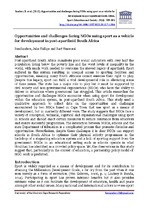Opportunities and challenges facing NGOs using sport as a vehicle for development in post-apartheid South Africa
Abstract
Post-apartheid South Africa manifests poor social indicators with over half the population living below the poverty line and the worst levels of inequality in the world, with much work needed to overcome the skewed legacy of apartheid. Sport suffered in this system resulting in unequal access to sporting facilities and opportunities, meaning many South Africans cannot exercise their right to play. Despite this legacy, sport can fulfil a vital developmental role in alleviating some of these issues. The state has a major role to play but it must be supported by civil society and nongovernmental organisations (NGOs) who have the ability to deliver in situations where government has struggled. This article researches the opportunities and challenges NGOs encounter when using sport for development within the education system, in post-apartheid South Africa. This study used a qualitative approach to collect data on the opportunities and challenges encountered by two NGOs based in Cape Town that use sport as a means of development, but in markedly different ways. The study suggests that NGOs face a variety of conceptual, technical, logistical and organisational challenges using sport in schools and should enact certain measures to reduce resistance from educators and ensure successful programmes. The interaction between NGOs, schools and the state Department of Education is a complicated process that presents obstacles and opportunities. Nevertheless, despite these challenges it is clear NGOs can support schools in South Africa to optimise their physical activity programmes in the backdrop of a stagnating education system and a lack of sporting support from the government. NGOs in an educational setting such as schools operate in what Houlihan has identified as a crowded policy space. Yet, the observations in this study suggest that, particularly in the context of education, a partnership policy model of NGO work is preferred.

